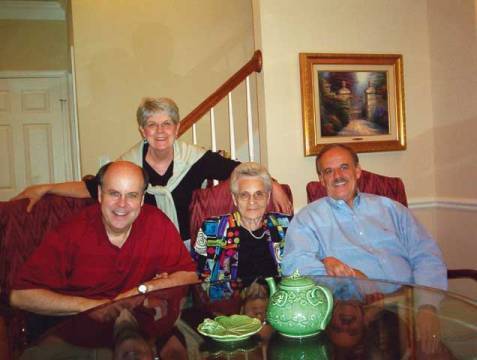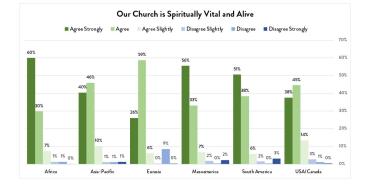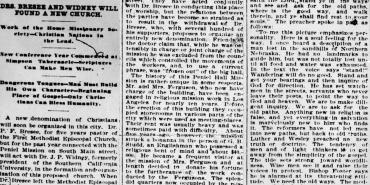"Come Here"

Holy Week was filled with holy moments as, for four days, I visited "those who were sick and in prison." My 90-year-old mother lives in an Alzheimer's unit. The staff must lock the doors to keep the patients from wandering. To enter, you must press a big red button on the outside wall. To leave, you have to know the keypad combination.
My wife, Carol, and I spent time with my mother, Margaret. We tried a jigsaw puzzle. Mom worked hard at it and matched a few pieces. We pushed her wheelchair around the building. I think she recognized me as her youngest child. At least her eyebrows went up and a big smile filled her face every time she saw me.
We met Mom's new friends. Sixty-year-old Mae used to be a communications and drama professor at a university in New Orleans. Yvonne was a master gardener. And then there was Hilda. While we visited Mom, Hilda sat in a wheelchair in the corner, always slouching down and to the left. Constantly and longingly, day and night, she repeated two words from her wheelchair: "Come here." It was not loud or obtrusive, but she was stuck on those two words. "Come here."
I have been thinking about Hilda. We each have a lot of Hilda in us. We are lonely and hurting and helpless, and we long for somebody, anybody, to come to us. We have invited a lot of people and activities and stuff to enter our lives, hoping any of this would be our answer, only to be disappointed time and time again. Disappointed, that is, until Jesus came to us and said, "I have come that you might have life and have it more abundantly."
That Holy Week was memorable for me. We celebrated His death and resurrection—His Passion.
I was reminded that our living Lord is present even in difficult places—especially in difficult places.
He is faithful to hear the cries of every Hilda and to respond.
It was difficult to leave Mother after that visit. I was not certain I would see her again in this life. We left her at the dinner table. I kissed her on the forehead and said, "I'll see you later Mom." As I walked over to the keypad, I noticed that she kept smiling. The door opened and I looked back. Mom was still smiling, still watching us. I cried the six blocks back to my sister's house.
Things have changed since that visit. Now, Mom is down to one word, "yes," one facial expression, a smile, one memory—she bows her head when we offer to pray.
One day, in God's perfect timing, He will be standing at the big red button on the wall. I am certain of a few things. He won't need to use the button to gain entrance to the Alzheimer's unit. He will probably find my mother at the dinner table. Through her foggy brain, she will know immediately who He is. She will still be smiling. And Jesus will tenderly say, "Margaret, come here."
Bob Broadbooks is director of the USA/Canada Office for the Church of the Nazarene.
Holiness Today, March/April 2010
Please note: This article was originally published in 2010. All facts, figures, and titles were accurate to the best of our knowledge at that time but may have since changed.




